People
Flight Crew
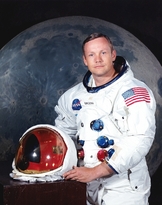 Neil A. Armstrong
Commander
Neil A. Armstrong
Commander
- 206 hours in space
- 2 missions
- 38 age at launch
A test pilot for NACA with experience on the X-1B and X-15 before moving to NASA's astronaut program in 1962, Neil Armstrong had been Command Pilot of Gemini 8, and was backup command for Apollo 8, the first crewed flight to the moon, being selected as commander of Apollo 11 while Apollo 8 was still in lunar orbit. Following Apollo 11 he taught at the University of Cincinnati and subsequently served as spokesman or board director of a number of companies.
Neil Armstrong (CDR) in words
See this quote by Neil Armstrong (CDR) in the transcriptHouston, Tranquility Base here.
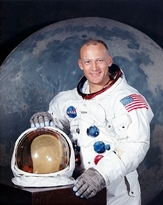 Edwin E. Aldrin, Jr.
Lunar Module Pilot
Edwin E. Aldrin, Jr.
Lunar Module Pilot
- 290 hours in space
- 2 missions
- 39 age at launch
A USAF fighter pilot who had served in Korea, Buzz Aldrin completed a ScD on astronautics at MIT, with his thesis concentrating on aspects of crewed orbital rendezvouz. Selected as a NASA astronaut in 1963, he was pilot of the last Gemini mission, setting a record for extra-vehicular activity. Since retiring from NASA, he has continued to promote space travel, and is a strong proponent of crewed missions to Mars.
Buzz Aldrin (LMP) in words
See this quote by Buzz Aldrin (LMP) in the transcriptOkay. This one sixth g is just like the airplane.
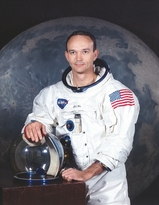 Michael Collins
Command Module Pilot
Michael Collins
Command Module Pilot
- 266 hours in space
- 2 missions
- 38 age at launch
A USAF fighter pilot and later test pilot who trained at Edwards with other Apollo astronauts Frank Borman and Jim Irwin, Michael Collins was selected as a NASA astronaut in 1963, and first flew as pilot of Gemini 10, with multiple rendezvouz and EVAs. He went on to write one of the best-regarded accounts of what it's like to be an astronaut, his autobiography Carrying the Fire: An Astronaut's Journey.
Michael Collins (CMP) in words
See this quote by Michael Collins (CMP) in the transcriptHouston. Apollo 11. The earthshine coming through the window is so bright you can read a book by it.
Mission Control
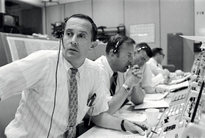 Capsule Communicator
Capsule Communicator
Throughout the Apollo Space Program, the CAPCOM was another astronaut who was the main person to communicate with the crew, as it was considered that someone who had that training would be best able to clearly pass information back and forth. On Apollo 11, there were four CAPCOMs operating in shifts.
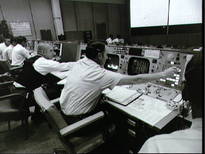 Flight Director
Flight Director
The flight director had overall operational responsibility for missions, leading their flight control team. On Apollo 11, there were three FLIGHT teams operating in shifts, Green, White, and Black. Shift changes are occasionally noted in the transcript.